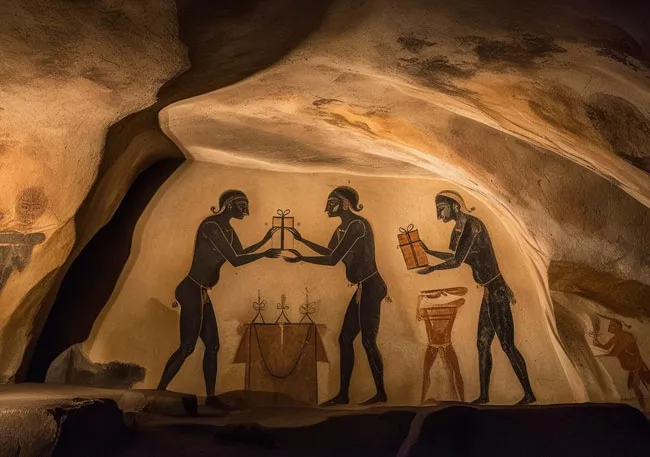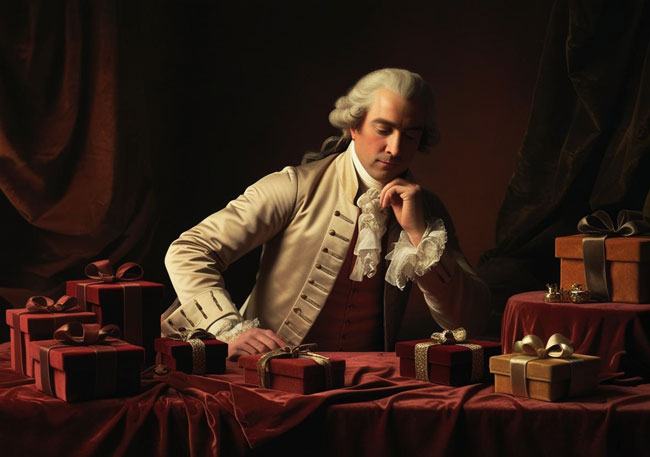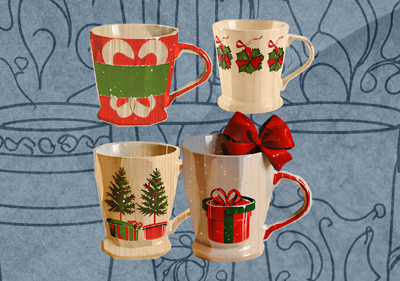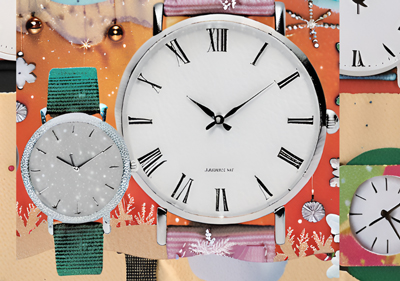The Modern Human's Guide to Gifting Like a Caveman
Find out how models of human behaviour that have been around ever since thousands of years can help us become better gifters and build better relationships through gifts.
The tradition of exchanging gifts has existed since before the dawn of civilization. The cavemen gifted rare fruits to their fellow cavemen they wanted to win over and not get murdered by.
We’re not the same unclothed, stone worshipping hunters & gatherers as our ancestors were, but the basics of human behaviour and the part that gifts play in building social relationships stays the same.
Gifts score us points with people and help us gauge other people’s social status and investment towards us. Even in the age of the equality movements and the general fight to become more fair and diplomatic in this world, the essential workings of the human mind stays the same.
You may have heard of the old adage that actions speak louder than words, and a gift, or at least the gesture behind it, speaks much louder than you can ever express with words (Unless you’re Martin Luthor King. That man could talk.).
The idea is not to give them the most shiny, expensive, or “impressive” gifts. No self respecting person feels good about a gift that seems like a bribe. Trying too hard makes us suspicious about the givers’ intentions, as it very well should be. People try to impress others with generosity out of insecurity and generally not out of a good heart.
In an episode of the TV series The Sopranos, Eugene Pontecorvo brings a set of expensive watches as gifts for his boss Tony Soprano and his family. We see suspicion on Tony’s face as he reluctantly accepts the gift.
As it turns out, Eugene had been wanting to retire from the job and settle down in Florida. He had inherited a fortune from his aunt who left him over two million dollars.

He needed Tony’s permission to retire as it’s not acceptable for someone to ever retire in this profession. Tony recognizes the watches for what they are, a bribe and eventually decides not to accept his request. The gift, in this situation, did more harm than good. No one wants to be seen as gullible and greedy.
Suggested

The Art of Seductive Gift Giving
Gifts are important in seduction. A well thought out & planned gift can make a great impression on your tar...
On the other hand, being too cheap or mindless about picking a gift for someone shows that we don’t value them enough to invest enough thought into the gift and doesn’t go well either.
Finding the right gift for someone is a three step process.
Figuring out the social rules that apply to gifting a person by understanding where they stand in your life and what they’re expecting.
Reflecting on their psychology and their needs.
Finding something that fulfills that need at some level.
Once you become familiar with the process and apply it in real life situations you’ll keep getting better at it. This will reflect in the improvements in your social relationships. Gifts won’t fix everything but the right gift at the right timing will surely help.
volutionary Roots of Gift Exchange
 I bet Charles Darwin was a great gifter
I bet Charles Darwin was a great gifter In any community and culture traditions and rituals help bring people closer by making them cooperate and get along.
On occasions such as Christmas or any celebration the entire family has to come together and spend time together in a generally cheerful environment. Kids get to see their cousins and the family they don’t usually get to meet.
These traditions are essential for a healthy community. Exchanging gifts is also a means of consolidating relationships. It’s a tradition designed to bond people together by encouraging altruistic behaviour.
Basically, if you take part and invest in this tradition despite the cost and effort required, then you’re a team player and display that you’re a good, loyal member of the community.
In an extensive study titled Gift Giving and the Evolution of Cooperation by H. Lorne Carmichael and W. Bentley MacLeod, they discuss how social customs is explicitly defined as behavioural rule or strategy that is taught to each new generation by its parents.
The children in most cases follow the rules unreflectively for the rest of their lives and, in turn, teach it to their own children.
Parents act as mentors in teaching the children about social customs so that they can be effective in social life and benefit from it.
This is similar to a master passing down his knowledge of his craft to his apprentice.
We humans mimic to learn. It’s the most efficient way there is. When our ancestors realized the benefits of exchanging gifts to improve social relationships they made traditions that were passed down to future generations.
The problem we face right now is because of the increasing complexity of the world due to the information age. The old passing down traditions and customs isn’t valid. We’re bombarded with too much information and it’s much more difficult to make up our minds about anything.
We are faced with so many decisions everyday that it’s exhausting.
Take into the fact that there is an endless variety of products available for consumers that when we do try to make a choice we struggle with decision panicking and are left with more stress.
What this means is that in the age of globalisation and a choice between amazon’s gift certificates to custom gifts of all sorts, it’s difficult to apply the knowledge that our parents passed down to us. We must come up with our own model for finding appropriate gifts.
So, let’s come back to the three step guide to finding an ideal gift for someone.
The Social Rules & Expectations
 Gift No Likey!
Gift No Likey! No gift is created equal. And nor is any recipient.
Just because your great aunt’s accountant nephew loved the multipurpose printer you gifted him, doesn’t mean your metalhead daughter will.
There are certain norms established in every culture that drives its people’s behaviour.
For example, in China it’s common practice to refuse a gift politely a couple of times before you accept it. The refusing part is not motivated by not wanting the gift rather it’s a way of expressing modesty and is just part of the cultural norms.
In Russia expensive gifts in the wrong contexts are perceived as bribes. The people determine the value of a gift depending on the relationship with the recipient and the occasion.
While it’s fine to gift an expensive watch to your wife for your anniversary present, gift it to someone you’re trying to close a business deal with, and they’re likely to take it the wrong way.
When you’re picking a gift for someone, you should think about a couple of factors to determine the cost and type of gift you need to buy.
These factors include:
Relationship with the intented recipient.
The average cost of gifts people spend on in your social circles.
Consider your relationship with the intended recipient. If you have exchanged gifts before, you should try to spend as much (If your budget allows it.) as they spend on your gift.
Say someone gifted your daughter a $300 coffee machine on her wedding, they’re expecting you to return the favour on their children’s weddings. If they have two, just split the budget in half for each. If they have none, you can gift them on their birthdays and such.
That is unless that person is rich and spends more money on a gift to you than you can affoard to return. In which case you should stick to the budget you normally intend on spending.
You don’t need to go broke trying to return the favour you can’t afford. They’re likely not expecting you to. And if you get the feeling that they do, rather than just tell them politely you’re not comfortable accepting such costly gifts.
This is easier said than done, but you’re better off doing this than putting a dent in your bank balance just to keep them happy. Not wanting to offend them this way despite problems it will lead to suggests insecurity on your part.
And this works the other way around too. You should avoid giving more expensive gifts than the norm just because you have more. It puts the recipient in an obligation and is not pleasant.
In any gift exchanging situation just find out the average amount of money people in your social circles are spending. You’ll know the ideal range to spend on a gift.
Don’t think of spending on a gift as something you’re obliged to do and have to do. Good Gifts will help improve your relationships with others and that will eventually help you build more social relationships and create opportunities in your career.
If you’re spending money on gifts for your children, avoid gifting them something they mentioned they want. We humans, by nature, value the things that we had to put in an effort into getting. And getting what they want is not something you want your kids to get used to, even if you can afford it.
The best way is to make them earn it. Make it a reward for something you want them to do. May be getting better grades in a subject they’ve been struggling with or helping out around the house.
It prepares them for the real world where you get what you earn.
In the end, when it comes to gifts you’ll have to look around and figure out what’s acceptable in your social circles. People follow norms. It’s a way to maintain order and keep things easy.
You don’t have to break the rules here. Picking a great gift is where you can shine.
Needs & Wants
 A single book isn't enough
A single book isn't enough In Abraham Moslov’s 1943 paper “A Theory of Human Motivation” He explains the hierarchy of needs that humans are motivated by. We tend to focus on getting what we lack for the moment and the personality is shaped by it.
Even decades after the study got published, the principles still hold true.
When it comes to material things apart from the essentials us humans are primarily motivated to own things to make our lives better.
That involves things that increase our social status (buying the latest iPhone or owning a porsche, gucci shoes, etc.).
The things that solve a problem for us (Noise cancelling headphones that helps you focus on work in a distracting environment, a book on increasing productivity, etc.).
And things that are entertaining and fun (Playstation console, sports tickets, novels, etc.).
Once you recognise the needs of the intended recipient of your gift, you can better understand what will they’ll like most to receive as a gift.
Our ancestors living in the brutal environments in the wilderness understood the need for empathy. The lack of a sophisticated verbal communication we have today required them to develop deep levels of observation about their fellow tribesmen’s moods and emotions.
For better cooperation with the group they relied during hunting and for protection from the outside tribes they had to be more sensitive to the moods of others.
This is where empathy originated from. It’s an evolutionary tool meant for survival of the species.
We have the same brain wiring that our ancestors had. Today, we call that mode of thinking “Putting yourself in their shoes” and it still has its evolutionary benefits.
It helps us bond with people in our modern day tribes we rely on for support–family and friends

This part of the process is important when picking gifts because everyone’s needs, based on their wealth, status, age, personality and emotional state at the point, differ. So no gift which is right for one will necessarily be right for someone else.
Take someone who is a college student for example. Their needs focus around their studies and campus life. So if you know of any of the things they have been trying to acquire, and you give it to them as a gift, it solves a problem.
If you have no idea about what they need, you can pick something that will add value to the life of a regular college student. If they read at all, may be gift them a book on college hacks, or a portable speaker to play some music.
Anything that adds value to someone’s life makes a good gift. A funny coffee mug won’t have much impact because it’s likely they have a coffee mug (Or a bunch of them they got as gifts.)
Unless, say, you know they procrastinate or dealing with some emotional issue and something as silly as a little motivational saying on a coffee mug that provides what they need at the moment will make a memorable present.
A new parent, on the other hand, buried with expenses that taking care of a baby is better off gifted something that will help with the task such as a play mat or a babysitter smuggled from Russia (Just kidding!). The point being, anything that helps make their lives easier will be liked.
Not that you stop looking at them as people with interests and only as parents. Sometimes a voucher for a nice dinner is what they really need and it will make a thoughtful gift.
If you’re finding a gift for a spouse pay attention to the desires they convey to you. They will make vague comments about some problems and insinuate a way to solve them. May be your wife needs a new dress for a function she needs to attend or a husband who keeps bringing up the latest version of some gadget.
When you notice these things and use it while picking up a gift for someone close to you, it shows that you are paying attention, which is very seductive. Us, humans, need to know that we’re being listened to. That not everything needs to be said out loud for our loved ones to understand them.
Understanding a person’s needs and wants is a crucial step when it comes to finding a gift that they will be really glad to have. And all you have to do is reflect on your interactions and observations to figure out clues on what it is they desire.
We all have needs and desires and the person to fulfill those at some level is valued.
3. The Ideal Gift
 She Seems Happy
She Seems Happy Benjamin Disraeli, who was the prime minister of Great Britain in the late nineteenth century, once sent the Queen Elizabeth I primroses as gift.
Primroses are not the ideal flowers someone would go at gifting someone they admired. They’re so ordinary that the receiver might get offended by the choice. But he sent them along with a note saying “Of all the flowers, the one that retains its beauty longest, is sweet primrose.”
Primroses soon became the Queen’s favorite flowers.
That’s the thing about gifts. No matter how simple the gift is, the receiver’s impression about it decides whether they will like it or not.
And the fact about impressions is; they’re quick to form and long to last.
The human brain registers first impressions amazingly fast. It doesn’t even take us a second before we make an impression about a stranger we just saw. And the opinion that these snap judgements lead to lasts for a long time and is very difficult to change.
This is our adaptive unconscious at work. The parts of the brain reserved for quick decision making.
In fact, once we make up our minds about a person and whether we like them or not, we stick to that opinion no matter what happens next.
We don’t like to second guess ourselves and waste brainpower on constantly making decisions.
The same thing applies for gifts. The moment they unwrap it and see it for the first time, you have about 3-4 seconds before they make up their mind whether they like it or they don’t.
Which Brings us to one handy little trick you can use to immediately determine the likeability of any gift. All you have to do is play a game called: What can I do with this?
Now if you know enough about the person and their likes, personality and needs, this isn’t difficult to do.
Remember, you’re not playing a telepath, you’re just trying to feel how the gift will be received to get the general idea. You can think more later.
The reason this works is because the moment we see some object that we could potentially own or do we try to determine its value by relating it to our lives.
The rule of thumb here is–if they can imagine themselves using it the foreseeable future, they’ll like it. If not, you might as well have given them a paperweight.
Say you gift a tennis racket to someone who has never set foot around ten miles of a tennis court, then you’re counting on the fact that they’ll start someday.
In their mind however they don’t see themselves using that racket to do anything other than to kill rats in the basement (Which is an unpleasant thought.), so, even if the thing cost you $200 it doesn’t have much value to them.
Price Tag of an item doesn’t always assure the likeability of it as a gift. You can gift your kid a minivan and they won’t like it because they don’t want to drive around in a minivan.
Gift them a less costly but less socially punishing car and they’ll like it more.
In a nutshell, likeable gifts are those which the receiver can imagine adding value to their lives. If you can’t put yourself in their shoes and imagine using that thing, chances are they won’t either.
Summary
When it comes to exchanging gifts, some things haven’t changed for thousands of years. Factors like social norms, human needs, personality, and application determine the likeability of a gift for any receiver.
The best we can do is stick to what we can learn from the study of human nature to best pick a gift that aims to fulfill a need and makes a good impression, thereby building a better relationship with our tribe.
But if even after the effort, money and thought you put into finding a gift doesn’t make them appreciate the present, you shouldn’t take it personally.
Some people are just too self obsessed and unappreciative. You shouldn’t bother trying to please them.
Do good things for those who are grateful. For those who are not, just do your part without expectations and move on.
Life is too short to be wasted on dealing with negative people. Invest in good relations and build better tribes. Just like a smart caveman would.

Dattaraj Pai
I’m the founder of Science of Gifts, a website dedicated to helping people find meaningful and thoughtful gifts. With years of experience researching the psychology of gift-giving, I explore how gifts communicate emotions, strengthen relationships, and create lasting memories.
Beyond writing about gifts, I have a background in storytelling and filmmaking, which fuels my passion for exploring the cultural impact of meaningful gestures.














